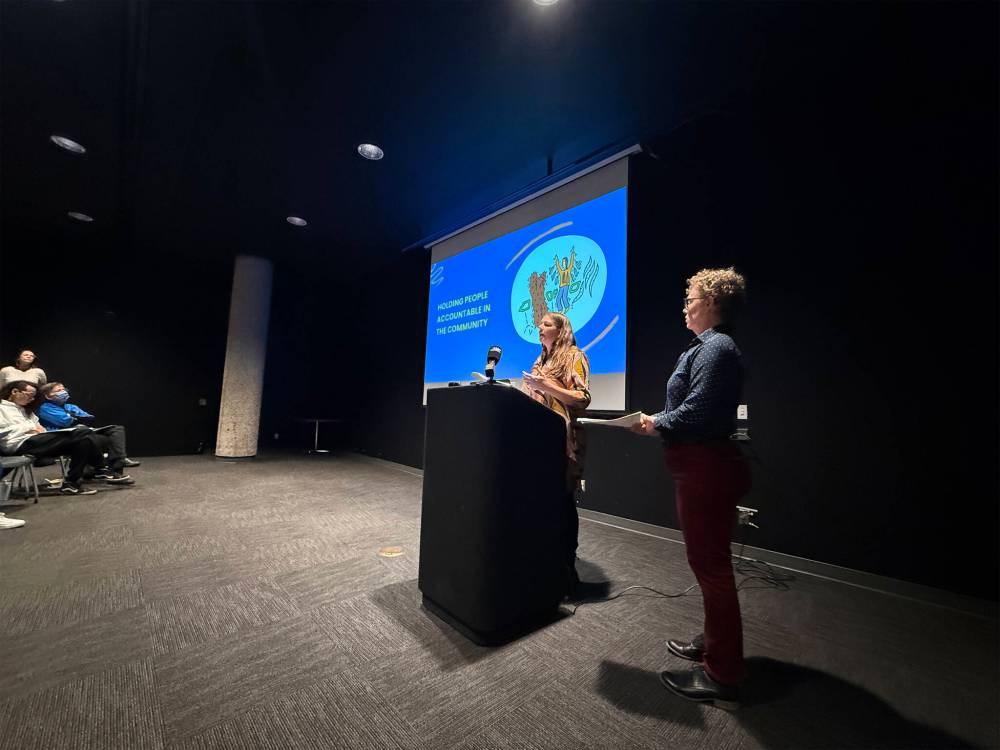Indigenous-led safety program hailed as model for Winnipeg spaces
Advertisement
Read this article for free:
or
Already have an account? Log in here »
To continue reading, please subscribe:
Monthly Digital Subscription
$0 for the first 4 weeks*
- Enjoy unlimited reading on winnipegfreepress.com
- Read the E-Edition, our digital replica newspaper
- Access News Break, our award-winning app
- Play interactive puzzles
*No charge for 4 weeks then price increases to the regular rate of $19.95 plus GST every four weeks. Offer available to new and qualified returning subscribers only. Cancel any time.
Monthly Digital Subscription
$4.99/week*
- Enjoy unlimited reading on winnipegfreepress.com
- Read the E-Edition, our digital replica newspaper
- Access News Break, our award-winning app
- Play interactive puzzles
*Billed as $19.95 plus GST every four weeks. Cancel any time.
To continue reading, please subscribe:
Add Free Press access to your Brandon Sun subscription for only an additional
$1 for the first 4 weeks*
*Your next subscription payment will increase by $1.00 and you will be charged $16.99 plus GST for four weeks. After four weeks, your payment will increase to $23.99 plus GST every four weeks.
Read unlimited articles for free today:
or
Already have an account? Log in here »
The city’s manager of library services hopes a new report that highlights the success of an Indigenous-led alternative to conventional security services will convince decision-makers to expand the program.
At a news conference Monday at the Millennium Library, Karin Borland spoke as researchers from the University of Manitoba and University of Winnipeg presented their findings on how community safety hosts practice Wâhkôhtowin — a Cree and Métis worldview rooted in kinship and interconnectedness — to create safety through relationship building.
“We want this report to be shared with as many people as possible,” Borland said. “We would like to have community safety hosts in all 21 of our public libraries.”

SCOTT BILLECK / FREE PRESS
Dr. Christine Mayor (left) and Dr. Julie Chamberlain present their findings at the Millenium Library on Monday after they studied how Wahkohtowin, a Cree and Métis worldview, has helped equip community safety hosts to better handle marginalized citizens accessing public resources, such as libraries.
Many Winnipeggers, especially Indigenous and marginalized people, may face barriers to public spaces and services due to racism, stigma, and punitive security. With high poverty, homelessness, and substance use rates, traditional security often deepens exclusion. Community safety hosts, who work alongside regular commercial security, focus on protecting relationships with a people-centred, Indigenous-informed alternative grounded in care and lived experience.
Currently, 10 safety hosts work across five city libraries, including Millennium. There are 42 safety hosts in total, with others working at Access Downtown, Crossways, Employment, Income and Health Supports, the Link and Centre de Santé.
A new cohort of 21 trainees, the fifth since 2021, will soon graduate from the program, which combines the standard 40 hours of security guard training with an additional 130 hours focused on the principles of Wâhkôhtowin — the belief that we live in a universe defined by relationships and responsibilities to respect and care for one another.
“When you treat people like people, they’re going to act like people,” said Zoongizi Ode executive director Mary Burton.
Zoongizi Ode, a non-profit that empowers young Indigenous people, provides Wâhkôhtowin training to participants in the community safety host program. The organization partnered in 2021 with Persons Community Solutions Ltd., a social enterprise that specializes in community wellness and security.
“When you treat people like people, they’re going to act like people.”
Researchers analyzed data from six Winnipeg sites in 2022-2023 and found the model, which pays a living wage and employs people aging out of care and others with lived experience, has led to thousands of connections with library visitors, often helping people access services and supports.
The report also found the safety hosts face limits such as occasional police involvement, restrictive institutional rules, clashes with traditional security approaches, and broader systemic issues like poverty, housing shortages and the toxic drug crisis.
Researcher Julie Chamberlain said the next step following the release of the report will likely be to draft policy recommendations based on the findings.
“An obvious thing is for the city to give community safety hosts contracts because a lot of the spaces are city spaces,” said the U of W assistant professor, alongside U of M colleague Christine Mayor. “Different levels of government can do a lot by simply hiring community safety hosts in their spaces.”
Beyond that, she added, the goal is to find ways to weave the concept of kinship into public spaces more broadly.
scott.billeck@freepress.mb.ca

Scott Billeck is a general assignment reporter for the Free Press. A Creative Communications graduate from Red River College, Scott has more than a decade’s worth of experience covering hockey, football and global pandemics. He joined the Free Press in 2024. Read more about Scott.
Every piece of reporting Scott produces is reviewed by an editing team before it is posted online or published in print — part of the Free Press‘s tradition, since 1872, of producing reliable independent journalism. Read more about Free Press’s history and mandate, and learn how our newsroom operates.
Our newsroom depends on a growing audience of readers to power our journalism. If you are not a paid reader, please consider becoming a subscriber.
Our newsroom depends on its audience of readers to power our journalism. Thank you for your support.










